Visão geral
No campo em rápido desenvolvimento do armazenamento de energia, a competição entre Bateria de enxofre de lítio (Li-S) e íon de lítio (íon de lítio) baterias tem atraído grande atenção, impulsionando a exploração de soluções de próxima geração. Este artigo tem como objetivo revelar o potencial de ambos, apresentando sua química básica, características de desempenho, e aplicações práticas.
Ao mergulhar no cenário competitivo entre baterias de enxofre de lítio e baterias de íon-lítio, pretendemos enfatizar o impacto potencial que essas tecnologias podem ter na remodelação da indústria de armazenamento de energia.
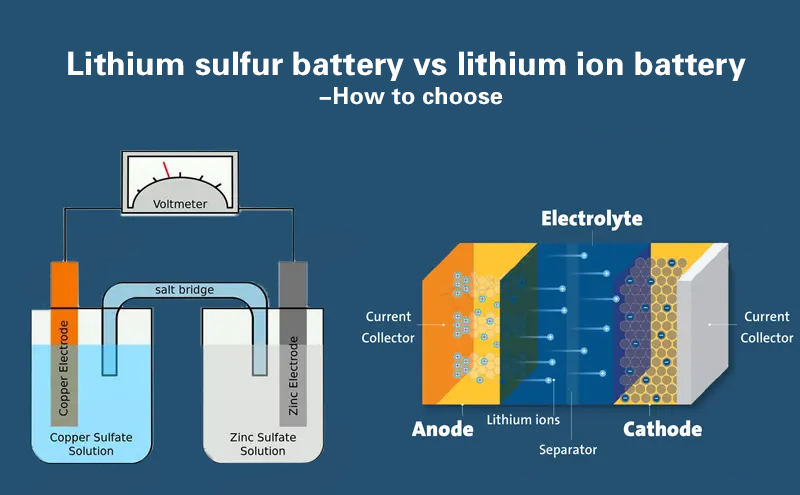
Por exemplo, o veículo elétrico (Ev) indústria está prestes a passar por mudanças significativas, e baterias de enxofre de lítio estão em uma posição de liderança.
Espera-se que estas baterias eletroquímicas inovadoras redefinam o futuro do mercado de armazenamento de energia, proporcionando vantagens únicas em relação às baterias tradicionais de íons de lítio.. Neste artigo, exploraremos as principais vantagens das baterias de enxofre de lítio em comparação com as baterias de íon-lítio, e como esses avanços nos levam a um uso mais limpo e sustentável.
O que é bateria de enxofre de lítio?
O enxofre é barato e abundante em reservas, e existe em grandes quantidades na Terra. Principalmente no processo de refino de petróleo e gás natural, grandes quantidades de elementos de enxofre amarelo muitas vezes se acumulam fora das usinas de combustíveis fósseis.
Para cientistas que estudam como as reações químicas geram eletricidade, o enxofre sempre foi considerado um material de armazenamento de energia muito atraente. Isso ocorre porque a combinação de lítio e enxofre tem o potencial de criar uma excelente bateria que pode não apenas armazenar mais energia, mas também é mais econômica do que as baterias de íons de lítio usadas atualmente em alguns cenários.
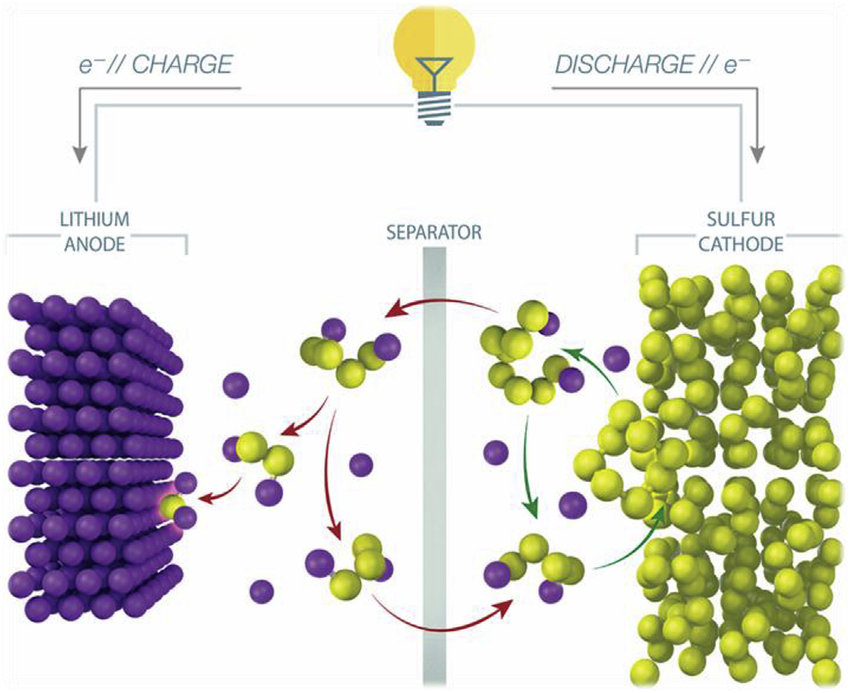
A bateria de enxofre de lítio é uma bateria recarregável que usa lítio como ânodo e enxofre como cátodo. Em comparação com outras baterias, baterias de enxofre de lítio são conhecidas por sua alta densidade de energia e potencial de baixo custo. Durante o processo de alta, íons de lítio no ânodo reagem com enxofre no cátodo para gerar sulfeto de lítio e liberar elétrons. Ao carregar, esse processo será revertido, permitindo que a bateria seja carregada e usada repetidamente.
O que é uma bateria de íon de lítio?
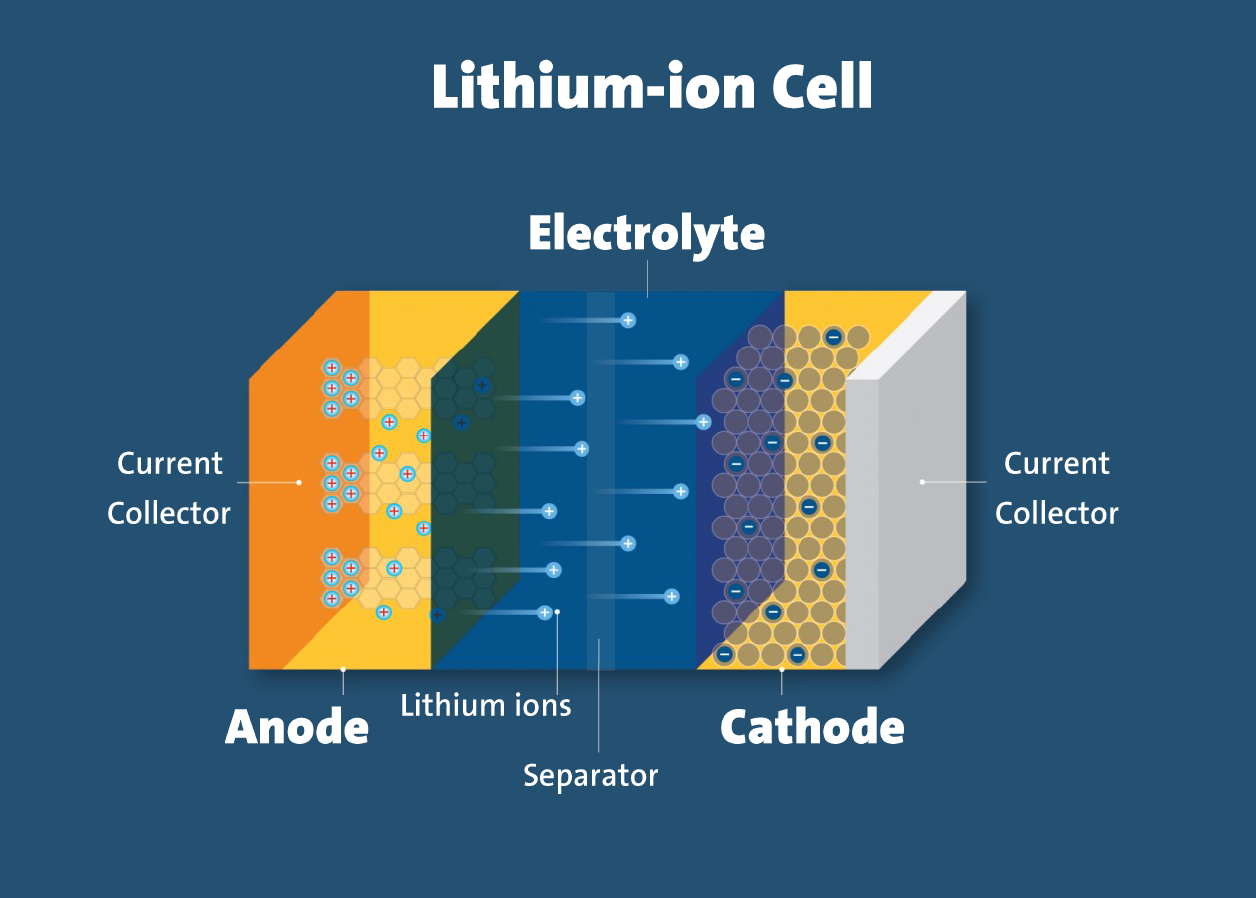
As baterias de íon de lítio também são um tipo comum de bateria recarregável.
Armazena e libera energia através do movimento de íons de lítio entre o ânodo e o cátodo. Durante o processo de alta, os íons de lítio se movem do ânodo de grafite através do eletrólito até o cátodo de óxido metálico normalmente composto de cobalto, níquel, ou manganês, gerando uma corrente elétrica. E durante o carregamento, esse processo será revertido.
As baterias de íon de lítio são divididas em baterias de íon de lítio de estado sólido e baterias de íon de lítio líquido com base em sua forma eletrolítica. E sua composição química de íons de lítio é diferente, e é dividido em vários tipos de baterias.
Para informações detalhadas sobre categorias, consulte este artigo: 6 Tipos químicos de baterias de íon de lítio que você pode escolher.
As baterias de íon de lítio são amplamente populares devido às suas excelentes características, como alta densidade de energia, ciclo de vida longo, e peso relativamente leve. Eles se tornaram a escolha preferida para veículos elétricos (Ev) baterias e uma importante fonte de energia para equipamentos de tecnologia moderna e veículos de transporte.
Bateria de enxofre de lítio versus bateria de íon de lítio ——Quais são as diferenças entre
Ao comparar baterias de enxofre de lítio e baterias de íon de lítio, haverá certas diferenças em diferentes aspectos. A comparação a seguir é baseada em uma consideração abrangente do estado atual do desenvolvimento tecnológico e dos resultados de pesquisas em andamento..
Quais são as vantagens das baterias de enxofre de lítio?
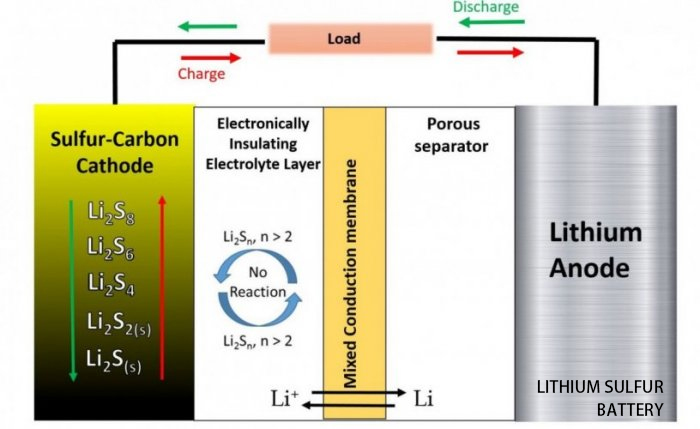
Maior densidade de energia : A densidade de energia das baterias Li-S é significativamente maior do que a das baterias de íon-lítio, atingindo até 500Wh/kg, que é cerca de cinco vezes maior que as baterias tradicionais de íons de lítio.
Mais econômico : Como mencionado anteriormente, a Terra tem reservas abundantes de enxofre, o que torna o preço das matérias-primas de enxofre muito baixo. Portanto, a longo prazo, baterias de enxofre de lítio têm maior potencial de custo-benefício.
Benefício ambiental : O enxofre é um material não tóxico, e as baterias de enxofre de lítio são mais ecológicas do que as baterias de lítio que podem usar metais pesados no eletrólito.
Quais são as desvantagens da bateria de enxofre de lítio?
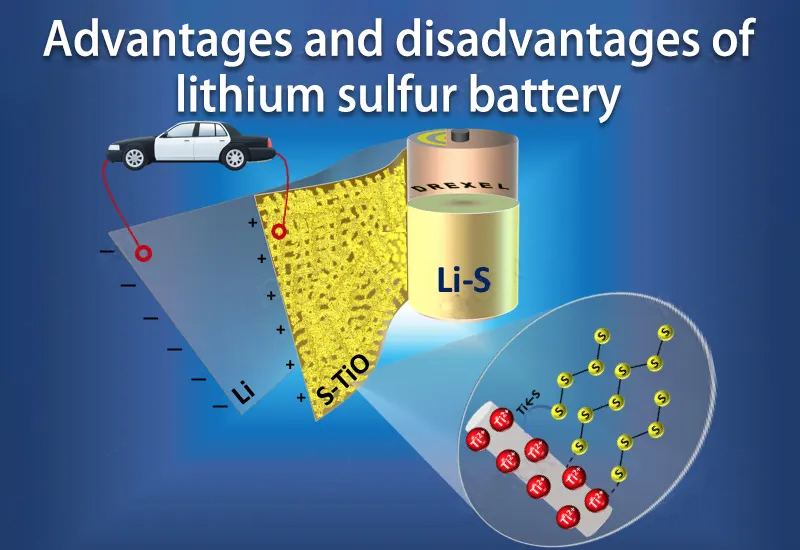
Menor número de ciclos : Polissulfetos se dissolverão no eletrólito, fazendo com que a capacidade das baterias de enxofre de lítio diminua gradualmente, resultando em um ciclo de vida relativamente curto.
Má condutividade : A condutividade do enxofre e de seus produtos de descarga é baixa, então aditivos condutores precisam ser adicionados para melhorar a condutividade. Isso ocupará algum espaço de design, reduzindo assim a densidade geral de energia da bateria.
Expansão de volume : Durante o ciclo de carga e descarga, o volume da bateria de enxofre de lítio mudará significativamente, até um máximo de 80%. Esta mudança significativa de volume pode levar a uma diminuição no desempenho mecânico da bateria, afetando assim sua estabilidade e vida útil.
Quais são as vantagens das baterias de íon de lítio?
Vida útil mais longa : As baterias de íon de lítio normalmente têm um ciclo de vida longo e podem passar por milhares de ciclos de carga e descarga antes que seu desempenho diminua significativamente.. As baterias de íon de lítio apresentam maior estabilidade e confiabilidade durante o uso a longo prazo.
Maior eficiência : A eficiência coulombiana das baterias de íon de lítio é muito alta, até mesmo 99%, o que significa que há muito pouca perda de energia durante o processo de carga e descarga. A alta eficiência Coulombic garante que a conversão de energia das baterias de íons de lítio seja mais eficiente durante o uso.
Tensão estável : As baterias de íon de lítio podem fornecer tensão de descarga estável, o que é crucial para o funcionamento normal de dispositivos eletrônicos.
Uma saída de tensão estável pode garantir um desempenho consistente do dispositivo durante o uso, evitando anormalidades funcionais ou danos causados por flutuações de tensão.
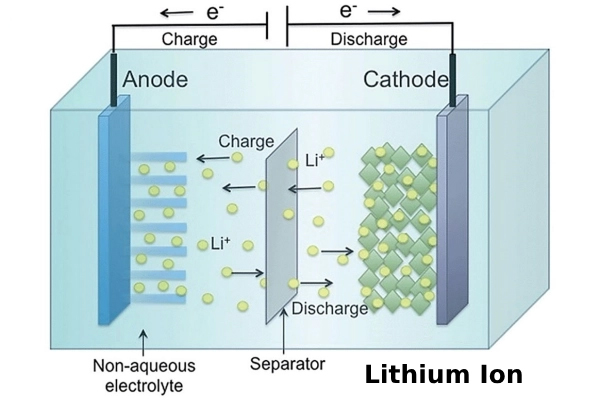
Quais são as desvantagens das baterias de íon de lítio?
Alto custo : As baterias de íon de lítio são relativamente caras principalmente porque usam materiais caros, como cobalto. No entanto, as atuais baterias de íon de lítio são prejudicadas pelo fornecimento limitado de níquel.
O cobalto é outro componente chave das baterias de íons de lítio hoje, produzido principalmente na República Democrática do Congo, onde as minas de cobalto são atormentadas por questões de direitos humanos. Houve apelos para parar essa mineração.
Riscos de segurança : Se a bateria estiver danificada ou carregada incorretamente, pode aumentar o risco de incêndio devido à inflamabilidade do eletrólito. Os riscos de segurança das baterias de íon de lítio são muito maiores do que as baterias de chumbo-ácido, especialmente em climas de alta temperatura.
Efeito ambiental : O lítio e o cobalto têm impactos ambientais e éticos durante a extração e processamento destes dois elementos. Primeiramente, eles podem causar danos ao ecossistema durante a mineração, e em segundo lugar, produtos químicos nocivos podem ser liberados durante o processamento.
Além disso, as condições de trabalho envolvidas podem não estar em conformidade com as normas internacionais do trabalho, causando problemas éticos significativos.
Baterias de enxofre de lítio e baterias de íons de lítio – comparação abrangente

A densidade de energia teórica das baterias Li-S (500W/kg) é maior do que o das baterias de íon de lítio (150-250W/kg), o que os torna mais poderosos em aplicações que exigem armazenamento de alta energia.
A abundância e o baixo custo do enxofre podem tornar as baterias de lítio-enxofre muito mais baratas do que as atuais baterias de íon-lítio, e reduzir a dependência de áreas problemáticas, então as baterias de enxofre de lítio são geralmente mais baratas. Em contraste, baterias de íon de lítio são mais caras.
A vida útil das baterias de íon de lítio é relativamente longa, geralmente excedendo 1000 ciclos. A dissolução dos polissulfetos de lítio e a degradação dos cátodos de enxofre durante ciclos repetidos de carga e descarga levam à degradação da capacidade, resultando em uma vida útil mais curta das baterias de enxofre de lítio.
Os eletrólitos da bateria de íon de lítio são inflamáveis e podem representar um perigo. O enxofre não é inflamável e tem baixa toxicidade. Após tratamento técnico, ainda pode produzir enxofre não tóxico. As baterias de enxofre de lítio são geralmente consideradas mais seguras e mais ecológicas.
Comparado às baterias de íon de lítio, baterias de enxofre de lítio têm uma taxa de autodescarga mais baixa, o que significa que eles podem reter a energia armazenada por um longo período de tempo. Em contraste, baterias de íon de lítio têm um ciclo de vida mais longo e maior densidade de energia real.
Comparado com baterias de íon de lítio, a tecnologia da bateria de enxofre de lítio ainda está nos estágios iniciais de desenvolvimento. Superando desafios técnicos relacionados à estabilidade do cátodo de enxofre, compatibilidade eletrolítica, e o desempenho geral é crucial para aplicações generalizadas.
Embora ainda esteja em fase de pesquisa e desenvolvimento, baterias de enxofre de lítio mostraram potencial em aplicações que exigem maior densidade de energia, como veículos elétricos e armazenamento de energia em escala de rede, com vantagens em peso leve e economia.
Como fazer a melhor escolha entre baterias de enxofre de lítio e baterias de íon-lítio?
A escolha entre baterias de enxofre de lítio e baterias de íons de lítio depende das necessidades e limitações específicas da sua aplicação.
Por exemplo, nos requisitos de aplicação, considerando a alta densidade energética do produto: As baterias Li-S podem ser mais adequadas para aplicações como veículos elétricos ou aeroespaciais., já que a alta densidade de energia é crucial.
Se você precisa de baterias de longa duração, como produtos eletrônicos de consumo ou armazenamento em rede, então as baterias de íon de lítio são uma escolha melhor porque têm um ciclo de vida mais longo.
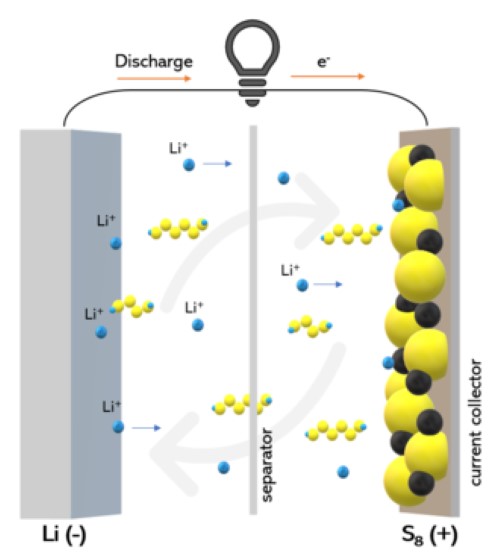
Se o custo é a principal consideração, então comparado aos metais usados em baterias de íon de lítio, enxofre tem custo menor, então as baterias de enxofre de lítio podem ser mais atraentes para você. Ao mesmo tempo, o custo total de propriedade, incluindo o custo de substituição da bateria, também precisa ser considerado.
Se for dada prioridade à redução do impacto ecológico e à segurança: para aplicações críticas de segurança, como dispositivos médicos ou dispositivos eletrônicos portáteis, as propriedades não combustíveis do enxofre nas baterias de enxofre de lítio têm vantagens.
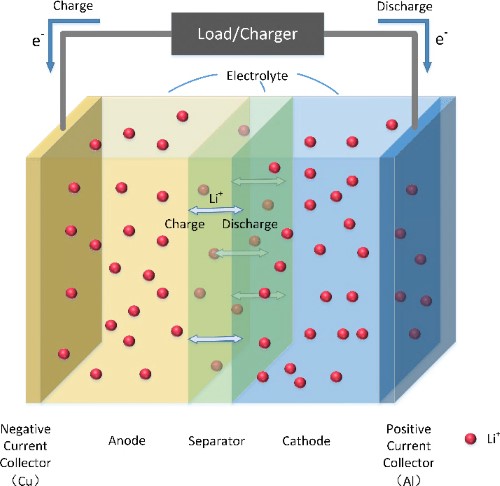
Além disso, baterias de íon de lítio normalmente fornecem tensão mais estável e maior eficiência, tornando-os mais adequados para aplicações que exigem potência estável. Para aplicações com requisitos de carga elevados, como ferramentas elétricas ou veículos elétricos, a robustez e a eficiência das baterias de íons de lítio têm vantagens significativas.
Conclusão
Resumindo, enxofre de lítio (Li-S) fornece um produto de bateria atraente para alternativas tradicionais de bateria de íon de lítio devido à sua excelente densidade de energia, eficiência leve, redução de custos, e capacidade de carregamento rápido. Por exemplo, no mercado de baterias, como veículos elétricos, também tem certas vantagens em suas próprias baterias, que deverá revolucionar o campo dos veículos elétricos.
As perspectivas do LiSB residem na sua impressionante densidade energética e no enxofre – um material mais abundante e menos problemático em comparação com os metais actualmente utilizados nos LIBs.. Com progresso contínuo em pesquisa e desenvolvimento neste campo, baterias de enxofre de lítio estão avançando.
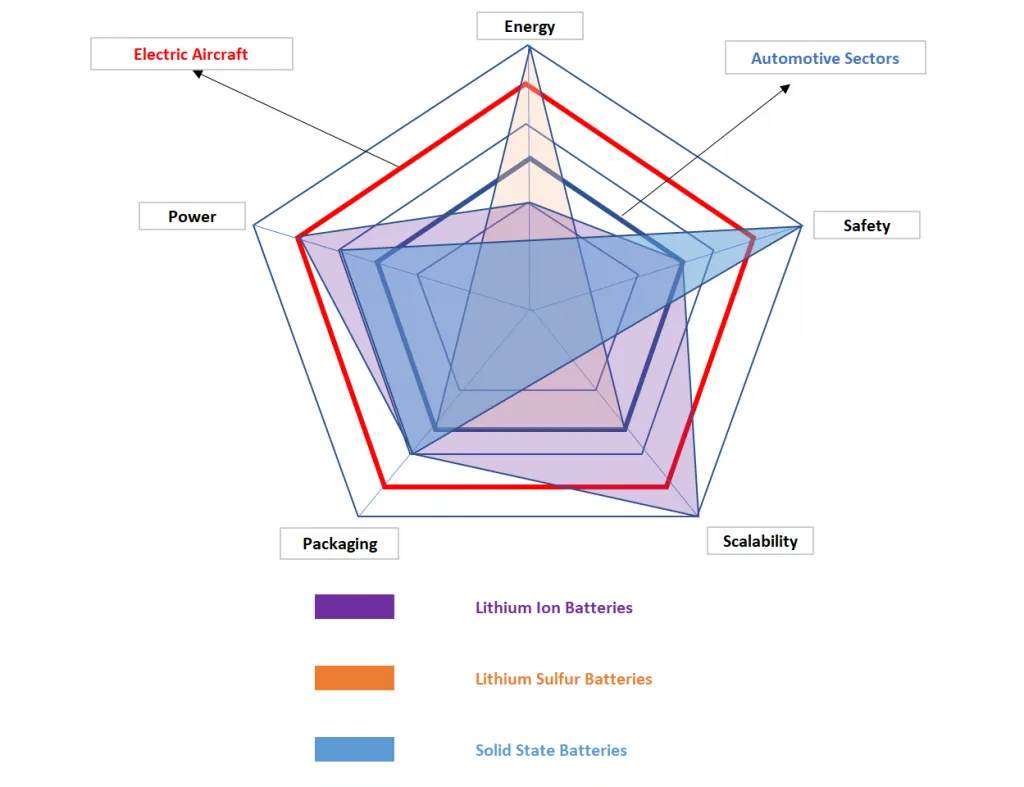
O avanço da tecnologia de baterias tem favorecido cada vez mais o potencial das baterias Li-S como um sistema de armazenamento de energia de alto desempenho. Tornando-se um potencial forte concorrente no mercado de baterias de íons de lítio. Embora alguns problemas significativos com baterias de enxofre de lítio sejam evidentes, novas conquistas tecnológicas foram feitas para resolver esses problemas, como nanoporoso membranas e estruturas de eletrodos inovadoras. Com a atual eletrificação da sociedade, o caminho de desenvolvimento do LiSB é claro: desenvolvendo pesquisas, superando barreiras tecnológicas, e expandindo a escala de produção para entrar no mercado de massa. Pode-se dizer que a bateria de enxofre de lítio tem um futuro promissor.
Perguntas frequentes
Quanto tempo podem durar as baterias de enxofre de lítio?
As baterias Li-S normalmente podem sofrer cerca de 300-500 ciclos de descarga de carga, após o qual a capacidade diminuirá significativamente. Portanto, sua vida útil é geralmente menor que a do íon-lítio (íon de lítio) baterias. Isto se deve principalmente à dissolução de polissulfetos e à consequente perda de substâncias ativas. Atualmente, a principal direção da pesquisa também é como melhorar a vida útil das baterias de enxofre de lítio.
A bateria de enxofre de lítio é inflamável??
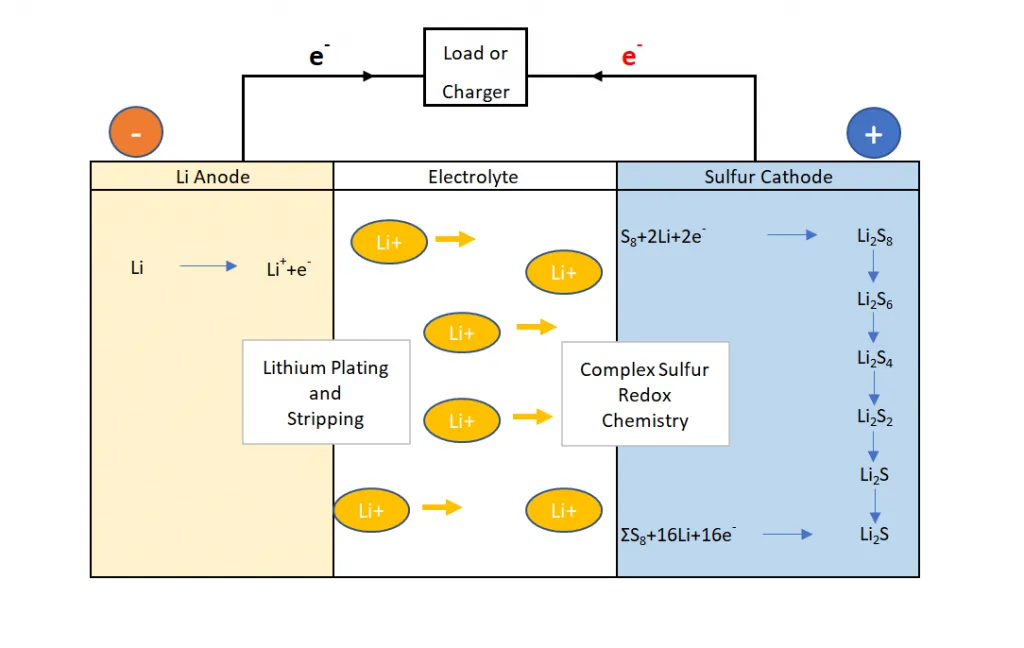
As baterias de enxofre de lítio são geralmente consideradas mais seguras e menos inflamáveis do que as baterias de íon-lítio. Isso ocorre porque o enxofre não é inflamável e tem menor reatividade do que os óxidos metálicos usados nas baterias de íon-lítio..
No entanto, os eletrólitos e outros materiais utilizados na estrutura das baterias de enxofre de lítio ainda afetam sua segurança. Isso também pode ser entendido. Para gerar uma reação química, certas condições são necessárias, e a reação gera energia. Desde que seja usado razoavelmente, riscos podem ser evitados.
As baterias de enxofre de lítio podem ser comercializadas?
Claro, mas atualmente as baterias de enxofre de lítio não têm sido amplamente utilizadas comercialmente.
Embora as baterias de enxofre de lítio tenham grandes perspectivas devido à sua alta densidade energética e vantagens de custo, eles ainda estão em fase de pesquisa e desenvolvimento. Algumas empresas já começaram a desenvolver produtos comerciais, mas ainda levará algum tempo para entrar oficialmente no mercado.
O enxofre de lítio em estado sólido é uma bateria de íons de lítio? Quais são suas características?
Lítio em estado sólido baterias de enxofre usam eletrólitos sólidos em vez dos eletrólitos líquidos comumente encontrados em baterias de íons de lítio.
Pode-se considerar que as baterias de lítio-enxofre de estado sólido são um tipo de bateria de íon-lítio, embora as baterias de lítio-enxofre de estado sólido não sejam iguais às baterias tradicionais de íon-lítio. Mas na categoria de baterias de lítio, e eles têm semelhanças na tecnologia de baterias recarregáveis.
As baterias de enxofre de lítio se tornarão a próxima geração de baterias que superarão as baterias de íon-lítio ou ainda melhor?
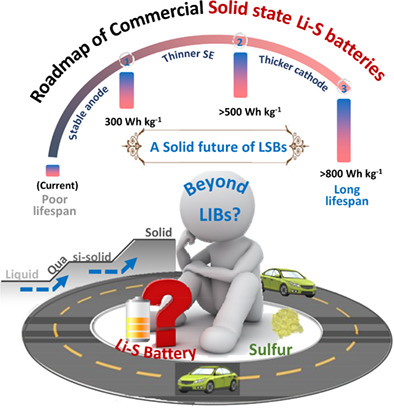
Um dos principais gargalos na pesquisa é a má ciclagem de baterias de enxofre de lítio. A solução atual é adotar métodos no material, eletrodo/eletrólito, e níveis de integração de bateria para transformar LSB de líder em verdadeiro líder na busca de “ultrapassar LIB”. O mercado acredita que na esperada comercialização do LSB na próxima década, a “tendência líquida” será gradualmente substituída pelo “futuro de estado sólido”. Isto também pode resolver o problema da degradação da capacidade causada pela dissolução de polissulfetos no eletrólito, o que pode afetar a vida útil das baterias de enxofre de lítio.
